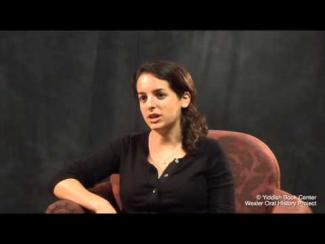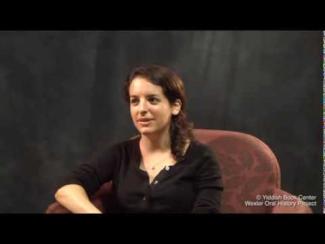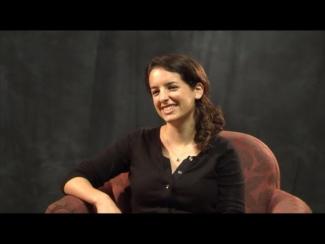The Yiddish Book Center's
Wexler Oral History Project
A growing collection of in-depth interviews with people of all ages and backgrounds, whose stories about the legacy and changing nature of Yiddish language and culture offer a rich and complex chronicle of Jewish identity.
Emma Morgenstern's Oral History
Emma Morgenstern, student in the 2010 Steiner Summer Yiddish Program, was interviewed by Nora Feinstein on July 22, 2010 at the Yiddish Book Center in Amherst, Massachusetts. The interview primarily focuses on Emma's experiences in Jewish Culture and history, including her upbringing, undergraduate education, her postgraduate experiences in oral history, and her internship at the Yiddish Book Center in 2010. Emma was born in Westford, Massachusetts in 1988, and took many paths to her current understanding of Judaism and Jewish Identity. Emma discusses her childhood in the largely Jewish community of Chelmsford, Massachusetts where she gained a "comprehensive Jewish education" at Congregation Shalom. She began her undergraduate in linguistics at eighteen at the University of Pennsylvania, and found the transition to be a "total culture shock." She "took many paths…to get involved with Judaism and Jewish identity" while at the University of Pennsylvania, including studying Judeo-Spanish under Beth Wagner and attending an off-campus Reconstructionist synagogue to be exposed to "a new kind of Judaism." Emma then describes how she sees language and linguistics being connected to Jewish identity. She explains that "language is very connected to culture [and that] they can't be extracted from one another." Her interest in studying linguistics is a reflection of her personal interest in culture, Judaism, and Hebrew, and that it essentially "ties up all [her lifetime of] experiences." Emma goes on to discuss her postgraduate scholarship in Greece where she interviewed close to thirty residents of Rhodes and Thessaloniki in Greek and Judeo-Spanish, investigating the area's Jewish history and Judeo-Spanish roots. She details how she found her subjects, and the local community groups and residents who helped her with her research. Her work began when she was awarded a scholarship for her trip to study abroad. "Markos," a man at a synagogue in Rhodes, helped her with her Greek and to become acclimated to Greece, Greek culture, and with making appointments to meet with Judeo-Spanish speakers. Her first interviews was with two elderly Greek men in Rhodes, one who was a Holocaust survivor who explained that the large Jewish population in the area was part of a resettlement project for Jews to return to Rhodes and Thessaloniki (Salonica). When she travelled to Thessaloniki three weeks into her work, she learned of its history as one of the few historically Jewish majority cities in the world. After World War II, fifty to seventy thousand Jews, or ninety-six percent of the population was killed during the holocaust. She worked with a local man "Marcel," who was instrumental in screening twenty-five interviewees who were central and active in the Judeo-Spanish speaking community. She then discussed the current population of eight hundred Jewish Salonicans, and the instrumental nature of the Jewish community of Thessaloniki that she described as meeting "with all my Jewish grandmothers and grandfathers all in one room." Her work with the Jewish community group was central to her research question and thesis, and she was "really happy to be able to record them… [it is] very important information for the world to have" but believes that Judeo-Spanish is dying out. Emma then discusses her current practice with Judeo-Spanish, and mentioned that she did not have many opportunities to practice. She does occasionally correspond with her professor and her classmates, practices with her interview recordings, and participates in the online ListServ group "Ladinokomunita," but wishes she "had more of a way to [practice Ladino]." Emma then discusses her experience as an intern with the Yiddish Book Center in Amherst, Massachusetts, taking courses in Yiddish and Yiddish history and culture, and completing a practicum with the Wexler Oral History project where she conducted oral history interviews. Over the course of her time in Amherst, she discovered many new aspects to linguistics through her approaches to Yiddish during this time, specifically that she once had "a superficial relationship with Yiddish" that has blossomed into a relationship of understanding and awareness – that she currently sees it as "most expressive language," "the best language," "the only language for expressing grief," and a colorful language that contains a variety of words that express ideas available in no other language that are culturally embedded in the language itself. Emma finished the discussion expressing optimism, but uncertainty over the current secular popularity of the language, and is interested in seeing what Yiddish looks like to the next generation of speakers. She mentioned that she will ideally be working in Jewish history in some capacity in the future once her graduate work is complete.
This interview was conducted in English.






